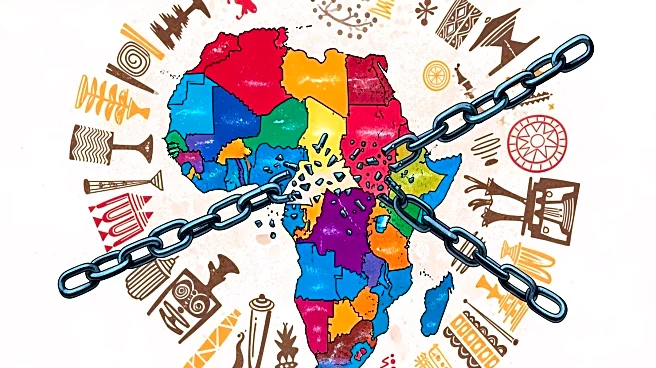What's Happening?
In October 1945, the Fifth Pan-African Congress was held in Manchester, marking a pivotal moment in African political history. The congress gathered delegates from around the world, including future leaders of African nations such as Jomo Kenyatta of Kenya and
Kwame Nkrumah of Ghana. The event aimed to address racial discrimination and colonial rule, advocating for liberation and self-determination for African countries. Manchester was chosen due to its strong black community and network of businesses, which provided support for the congress. The congress was attended by over 200 people, including political heavyweights and activists, and resulted in resolutions demanding an end to colonial rule and racial equity.
Why It's Important?
The Fifth Pan-African Congress played a crucial role in the success of independence movements across Africa in the decades following World War II. It united activists and leaders from various countries, fostering collaboration and strategic planning for liberation efforts. The congress highlighted the need for economic justice and fair wages, issues that remain relevant today. It also placed Manchester at the center of global liberation movements, showcasing the city's radical history and its role in advocating for racial equality. The event's legacy continues to inspire activism and calls for a more equitable world.
What's Next?
To commemorate the 80th anniversary of the congress, Manchester is hosting a series of events, including discussions and networking sessions at Manchester Metropolitan University. These events aim to explore the enduring legacy of the Pan-African Congress and its impact on racial equality and cultural leadership. Manchester City Council is organizing talks to highlight the congress's significance, and the Ahmed Iqbal Ullah RACE Centre will host a commemorative event at Central Library. These activities seek to celebrate Manchester's radical history and promote awareness of the congress's contributions to global liberation movements.
Beyond the Headlines
The congress not only influenced political movements but also empowered local communities in Manchester. It inspired individuals like Kath Locke, who co-founded the Abasindi Co-operative to benefit black women in the community. The congress's call to action continues to resonate, encouraging efforts to build a more equitable and humane world. Despite its historical significance, the congress's legacy is not widely celebrated in Manchester, with limited physical commemorations. Efforts are underway to increase awareness and recognition of the city's role in global liberation movements.















